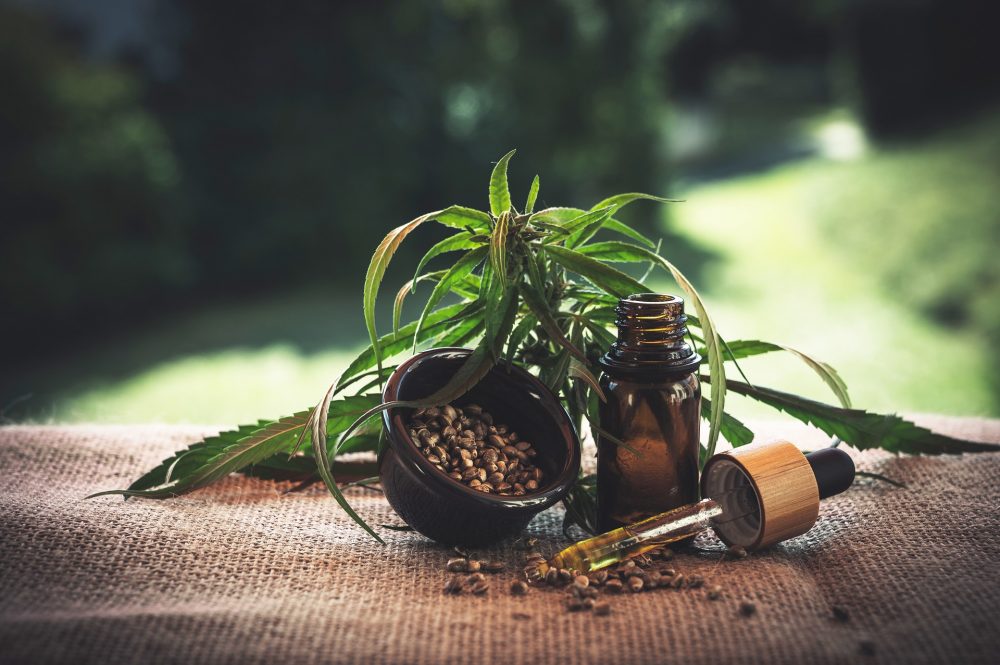Cannabidiol (CBD) is a rapidly growing industry. In 2020, just two years after being federally legalized, CBD sales reached $4.6 billion in the U.S.
CBD is a promising medicinal treatment for a range of human ailments including anxiety, insomnia, wound healing, pain, epilepsy, and more.
However, there has been a lack of scientific oversight in the development of new CBD products.
One big issue is that CBD degrades into THC, the psychoactive compound in the cannabis plant, over time with heat. This means when someone buys a commercial CBD product, there could be an unknown level of THC or other unlabeled chemicals in the product, posing serious health and safety risks. CBD can also turn into THC when exposed to acid, like that in the stomach.
“It’s taken off like wildfire,” UConn Professor of Chemistry Gregory Sotzing says. “But I think it’s happened with not too much science behind it…It’s like the wild west. You have no clue what’s on that shelf.”
Sotzing invented a CBD polymer that has the potential to create shelf-stable products, biodegradable plastics, and even serve as a drug delivery system.
Sotzing developed the polymer at UConn. In October 2021, Sotzing and Konstantine Drakonakis, an entrepreneur-in-residence for UConn Technology Commercialization Services (TCS) founded Polycannabinoid Therapeutics (PCTRx).
“I got involved in this because I think it’s going to be a huge disruption in the market, by bringing new medicines forward for the treatment of multiple diseases and helping people,” Drakonakis says. “There’s an utter lack of transparency and accountability in the cannabinoid market today. If it’s going to survive in a regulatory framework that preserves the ultimate value of these compounds, I think this technology is the thing that is going to enable that.”
“I think there are many issues and I hope things clean up soon, and I think this polycannabinoid technology can help clean up what I call the ‘wild west’,” Sotzing says.
I think there are many issues and I hope things clean up soon, and I think this polycannabinoid technology can help clean up what I call the ‘wild west’. — Gregory Sotzing
PCTRx has now licensed this bundle of technology from UConn. This will provide the company with the ability to pursue applications in the biotech and nutraceutical markets.
“For us, having a license validates the commercial value of the technology,” TCS Senior Licensing Manager Michael Invernale says. “It says there’s someone interested in it.”
The polymer Sotzing developed prevents the chemical reaction that turns CBD into THC and other byproducts. By constructing a polymer, a “daisy chain” of CBD and adipic acid, the molecules needed to create THC when exposed to heat or acid are tied up and cannot react with anything else. This creates a stable CBD product that stays CBD.
“The name of the game is to get it there and get it pure,” Sotzing says.
Sotzing’s lab tested the stability of the compound at up to 320 degrees Celsius (608 degrees Fahrenheit), and it did not produce THC, even when it combusted.
This polymer also boosts the bioavailability of CBD, which is normally about 8%. This means, normally, only 8% of the CBD goes where and does what it is supposed to. The innovations here permit increased CBD bioavailability, which is another value add in additional to reducing the THC generation. An application on PCTRx’s radar is use of the polymer as a drug delivery system that allows the CBD to bypass the acidic stomach and breakdown in the basic intestines, and then enter directly into the blood stream.
“Not only do you have a polymer you could potentially load drugs into, but the polymer itself is degrading into a drug,” Invernale says.
This polymer has even more advantages considering it is a natural antioxidant that can enter fatty tissue. This allows CBD to protect the body against radical oxygen and nitrogen species (ROS and RNS). Unlike other antioxidants, which interact with ROS and RNS to generate a less reactive version of these molecules, CBD polymers do not generate any new radicals. There are applications for chemotherapy treatments here too, which generate a tremendous number of free radicals.
“It’s not too hard to picture where a polymeric antioxidant made from renewable resources, all of which are natural materials, could be useful,” Sotzing says.
These are just a few example use cases. The polymer is a true platform technology with myriad potential applications. By changing the molecular weight and structure of the polymer, it could be used to create biodegradable plastics that would not need to be composted.
PCTRx is also exploring post-surgical pain applications for this CBD polymer technology since unlike opioids, it is non-addictive. In fact, CBD can help alleviate opioid cravings.
With this new licensure agreement, PCTRx plans to first investigate the safety, toxicity, and efficacy of their polymer as a CBD drug delivery system. They will focus their initial application efforts on sleep and pain treatments since these are the two most common uses for CBD currently.
“With any platform technology, there are so many ways you can go, and we’ll be spending the first year or two really exploring what those options are and who best to partner with,” Drakonakis says.



